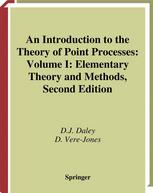

Most ebook files are in PDF format, so you can easily read them using various software such as Foxit Reader or directly on the Google Chrome browser.
Some ebook files are released by publishers in other formats such as .awz, .mobi, .epub, .fb2, etc. You may need to install specific software to read these formats on mobile/PC, such as Calibre.
Please read the tutorial at this link: https://ebookbell.com/faq
We offer FREE conversion to the popular formats you request; however, this may take some time. Therefore, right after payment, please email us, and we will try to provide the service as quickly as possible.
For some exceptional file formats or broken links (if any), please refrain from opening any disputes. Instead, email us first, and we will try to assist within a maximum of 6 hours.
EbookBell Team

4.8
44 reviewsPoint processes and random measures find wide applicability in telecommunications, earthquakes, image analysis, spatial point patterns, and stereology, to name but a few areas. The authors have made a major reshaping of their work in their first edition of 1988 and now present their Introduction to the Theory of Point Processes in two volumes with sub-titles "Elementary Theory and Models" and "General Theory and Structure".
Volume One contains the introductory chapters from the first edition, together with an informal treatment of some of the later material intended to make it more accessible to readers primarily interested in models and applications. The main new material in this volume relates to marked point processes and to processes evolving in time, where the conditional intensity methodology provides a basis for model building, inference, and prediction. There are abundant examples whose purpose is both didactic and to illustrate further applications of the ideas and models that are the main substance of the text.
Volume Two returns to the general theory, with additional material on marked and spatial processes. The necessary mathematical background is reviewed in appendices located in Volume One. Daryl Daley is a Senior Fellow in the Centre for Mathematics and Applications at the Australian National University, with research publications in a diverse range of applied probability models and their analysis; he is co-author with Joe Gani of an introductory text in epidemic modelling. David Vere-Jones is an Emeritus Professor at Victoria University of Wellington, widely known for his contributions to Markov chains, point processes, applications in seismology.